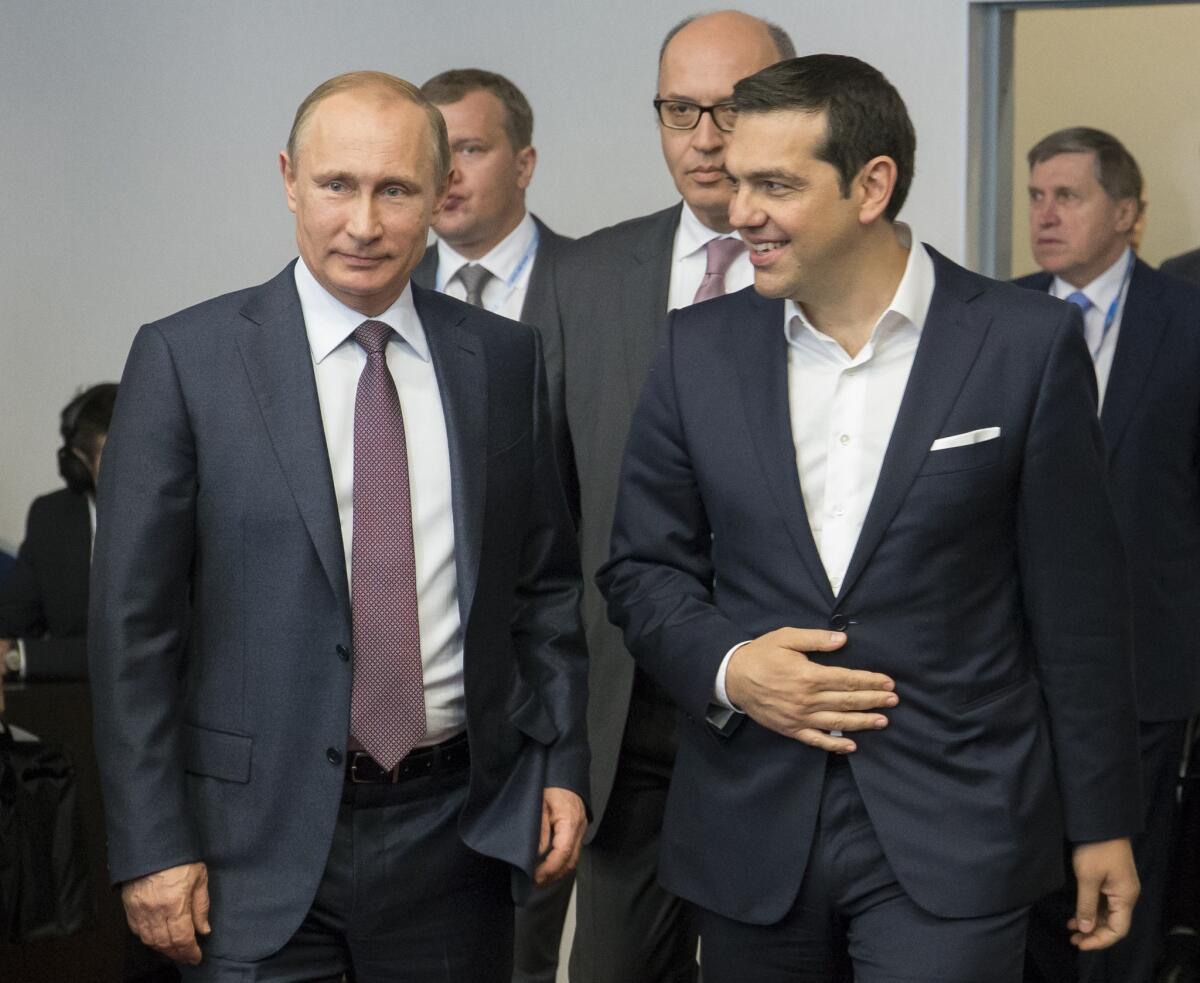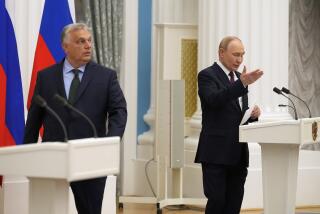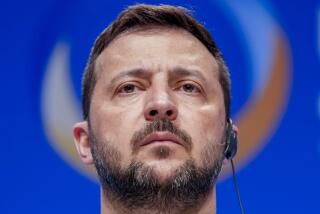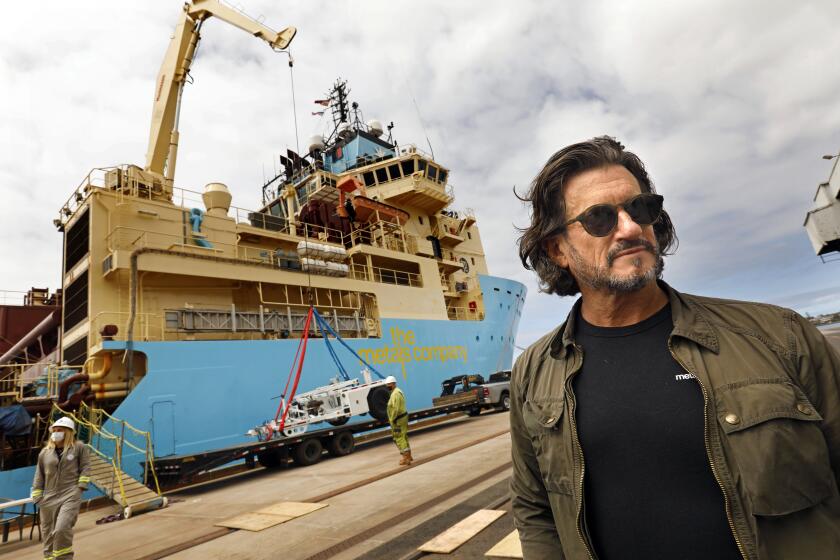Greek leader tells Russia he seeks ‘new harbors’ from European storm

Russian President Vladimir Putin, left, and Greek Prime Minister Alexis Tsipras arrive for their talks Friday at the St. Petersburg International Economic Forum in the Russian city.
With his Balkan nation on the brink of economic collapse, Greek Prime Minister Alexis Tsipras told a Russian economic forum on Friday that he was in search of “new harbors” from the storm of criticism and crippling austerity measures imposed on Greece by its creditors.
At the annual St. Petersburg International Economic Forum, Tsipras cast Greece as a ship navigating troubled waters as it faces a June 30 deadline for a $1.8-billion loan payment that it can’t cover without borrowing more. Athens’ creditors are refusing to provide more cash until Tsipras’ far-left government makes credible promises to straighten out its domestic finances.
“We are now in the middle of a great storm,” Tsipras told the forum of multinational CEOs and Russian oligarchs. “But we are a seafaring nation that knows how to navigate through storms and is not afraid of heading to new seas and reaching new harbors.”
Tsipras blamed the Greek economic crisis on misguided European Union policies, saying the Western alliance “should go back to its initial principals of solidarity and social justice.” He blasted the bloc’s emphasis on austerity measures as “leading us nowhere,” and concluded that “the so-called problem of Greece is the problem of the whole European Union.”
The quest for new refuge sounded to many like an appeal for a Russian loan to tide Athens over the looming debt payment. But Kremlin spokesman Dmitry Peskov told journalists that Tsipras made no appeal for direct financial aid during his meeting with Russian President Vladimir Putin on the sidelines of the St. Petersburg forum.
Peskov and Deputy Prime Minister Arkady Dvorkovich had, however, said before Putin met with Tsipras that Russia would consider providing loans to Greece if asked.
Greece and its creditors -- the International Monetary Fund, the European Central Bank and the European Commission -- have been deadlocked in talks aimed at drafting a new plan for reducing the staggering debt carried by Athens. The latest negotiating session, on Thursday, ended with no progress toward an agreement and harsh words from the lenders over Athens’ failure to bring new proposals to the talks.
Greece has received $270 billion in loans since 2010 in exchange for pledges to deeply cut government spending, pare down the bloated public payroll, raise taxes and fight corruption and tax evasion. While those austerity measures have caused the economy to contract by 25% over the past five years and boosted unemployment to 26%, they have failed to produce the revenues demanded by the European Union and the creditors to stabilize the economy and balance the national budget.
At Thursday’s meeting in Luxembourg of European Union finance ministers and the lending institutions, Greece was warned that time is running out to avert default and a forced exit from the 19-nation Eurozone. Greek depositors have already begun pulling their euros out of Greek banks in alarming quantities, with about $3.4 billion worth withdrawn this week, the Greek news site ekathimerini.com reported.
The run on deposits prompted the Bank of Greece to appeal to the European Central Bank on Friday for a 3.5-billion euro [$3.95 billion] emergency liquidity infusion to ensure that banks can reopen on Monday.
While the meeting with Putin reportedly yielded no overt bailout of Greece, Russian Energy Minister Alexander Novak announced a $2.77-billion deal to build an extension of a planned pipeline to carry Russian gas to Europe across Turkey. A Greek component of the gas delivery system, expected to come online in 2019, would provide Athens with hundreds of millions in transit fees each year on the new route that would bypass Ukraine and the now-adversarial relationship Russia has with its former Soviet sister republic.
Russia is suffering its own economic crisis due to sanctions imposed by the European Union and the United States over its seizure of Ukraine’s Crimean peninsula and support for separatists occupying two large regions of eastern Ukraine. The Russian economy has also been hard hit by the past year’s sharp drop in oil prices, on which the Kremlin depends for more than half of its annual budget.
Any Russian assistance to Greece could pay off for the Kremlin, though, as Athens might be induced to withhold approval of a planned extension of sanctions when the current ones expires next month. Under European Union rules, all 28 member nations have to approve such actions, and Tsipras has been harshly critical of the sanctions that have triggered a retaliatory boycott by Russia of European food exports.
Whether Tsipras and fellow leaders of the far left Syriza Party now in power will attempt to trade their allegiance to the European Union sanctions for Russian aid or joint ventures remains to be seen in the dwindling days before the loan payment deadline. Athens’ posture toward its European allies may be more apparent after Monday’s emergency meeting of European Union heads of state to discuss the Greek crisis.
Follow @cjwilliamslat for the latest international news 24/7
More to Read
Sign up for Essential California
The most important California stories and recommendations in your inbox every morning.
You may occasionally receive promotional content from the Los Angeles Times.






